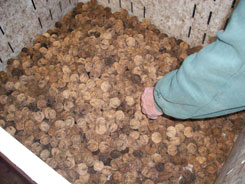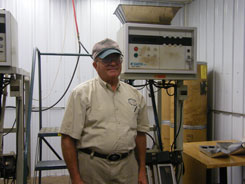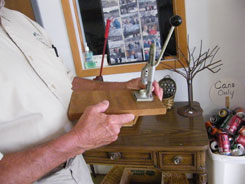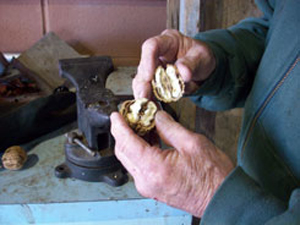
To produce and harvest the best-tasting, premium-quality orchard-grown tree nuts, including black walnuts and Northern pecans.
The Idea
In 2005 several members of Nebraska Nut Growers Association felt the need for a cooperatively-owned business to assist nut growers with selling unused or extra product, starting with black walnuts and pecans. This began Heartland Nuts ‘N More, a cooperatively-owned business spanning four states: Nebraska, Iowa, Kansas and Missouri. Larry Martin was one of the original starters of Heartland Nuts ‘N More and today is one of the leading members.
The idea for using black walnuts and pecans developed out of years of research conducted by Nebraska Nut Growers Association through the University of Nebraska—Lincoln. Martin said they had been doing research for about 35 years to learn how to grow a better black walnut in the Midwest and how to get pecans acclimated to the Midwest climate, since they are normally grown in the southern part of the United States.
Using this research it was discovered that due to Nebraska’s shorter growing season, about three months, producers could grow a nut that retained more of its natural oils which created a better, sweeter flavor. This occurs because the husk of the walnut is removed while the nuts are still green so none of the oils seep out and the meat does not darken. Martin said in the south the nuts tend to dry out due to the longer season.
“[Our methods] give [the black walnuts] a much sweeter taste. None of that bitterness you get with other methods of processing the black walnut.”
-Larry Martin
Martin said they always planned on starting a cooperatively-owned business, but that meant they needed members. The group started by collecting promissory notes or ‘letters of indebtedness’ from their (future) members. These letters were used to secure funds and product for the business.
The group also received some help with business and financial planning. Heartland Nuts ‘N More was introduced to Jim Crandall of Nebraska Cooperative Development Center (NCDC) through Grow Nebraska. NCDC assisted Heartland Nuts ‘N More with some initial work and securing grant funding. They used these grants to purchase production line machinery, such as nut crackers, and building improvement.
“If we hadn’t received those grants, we probably wouldn’t have started up at all.”
-Larry Martin
The Business & Products
Heartland Nuts ‘N More began with 32 member orchard growers and, as of 2010, had 46 member orchard growers. Several of these members boast large orchards including John Knorr, current president of Nebraska Nut Growers Association, who has around 2500 pecan and 1500 black walnut trees.
Heartland Nuts ‘N More is selling black walnuts and pecans in several local stores in Omaha and Lincoln including: Boiler Room, Whole Foods, Open Harvest, Ideal Foods and Grow Nebraska. There are also a few businesses that use Heartland Nuts ‘N More nuts in their products. Bakers Candies have used them to make black walnut clusters for a couple years and Martin said “they’re just flying out the door!”. Heartland Nuts ‘N More is also currently in negotiation with Prairie Land Dairy who is looking into using black walnuts and pecans in some of their ice cream.
Customers can purchase the nuts online through Heartland Nuts ‘N More’s website or Nebraska Nut Growers Association’s website, as well as, the Grow Nebraska stores in both Kearney and Grand Island. They also worked with Grow Nebraska at the 2009 and 2010 Nebraska State Fairs. Martin said they are looking into more year round markets to sell through and more opportunities to market in the Omaha area.
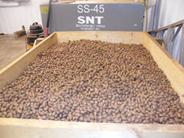
Heartland Nuts ‘N More advertises in several magazines, including Nebraska Life Magazine, and they are members of other cooperatively-owned businesses, including Buy Fresh Buy Local® Nebraska and Grow Nebraska.
The main reason Heartland Nuts ‘N More black walnuts and pecans differ from the competition is because of the way they are grown; all of their products come from only grafted black walnut and pecan trees. The members plant during spring, April to June, or fall, September to November, but most of the new trees are not added through planting but through grafting. The members graft the trees during the last two weeks in May and first two weeks in June. To start the grafting a grower takes a piece of scion wood from a mature black walnut or pecan tree and inserts the scion wood under the bark of a seedling. The limb will eventually attach itself to the younger tree creating a new limb. This process allows grafted trees to pollinate and produce nuts earlier than native trees, as well as, producing larger nuts; which is a characteristic of the mother tree.
“The weeks we graft the trees is the best time of the year because all the members come together and help out.” Said Martin.
Grafting creates a larger nut with a thin shell that’s very easy to crack. Heartland Nuts ‘N More grafted walnuts tend to have about 35-36% nut meat to nut while native or non-grafted trees tend to have about 6-8% nut meat to nut.
Harvest begins in late September and continues through October. During harvest they use a mechanized shaker to shake as many trees as possible to loosen the nuts and then catch the nuts on tarps or plastic. They also have a nut harvester to pick all the nuts up off the ground. When the members bring the nuts to the hub site in Valparaiso the nuts are cracked with machines.
“[The best part is the] camaraderie with all the people that have the orchards.
-Larry Martin

The walnut cracker can crack 300 pounds of walnuts in one hour and the pecan cracker can crack 500 pecans in one minute. The walnuts are then separated, using another machine, between dark and light colored nut meat. The nuts are all processed and packaged at the hub site, where they are kept in a cooler storage until they ship out for sale.
Sales for Heartland Nuts ‘N More are higher during the fall season due to an increase in baking; especially with pies, cookies and brownies. Martin stated that last year (2009) they brought in between 20 and 25 thousand pounds of black walnuts to crack and about 4000 pounds of pecans.
The Challenges
This year’s (2010) growing season did not produce the best pollination for black walnuts and pecans. Black walnut trees are air pollinated so they rely on wind to blow pollen from the male to the female flowers; but this year a majority of pollen either blew away or was washed away by abundant rains. Martin stated this problem appeared nationwide. Likewise, pecans suffered due to blooming or pollinating too soon.
A unique challenge that Heartland Nuts ‘N More faces is running a business across four states when there is only one hub site and all members are volunteers. Martin said they face problems when trying to get members to help process and package the nuts.
“A big problem is to have to call anyone in that lives outside Lincoln or Omaha,” Said Martin. “It takes time and money and everyone has to volunteer both.”
Another challenge the business faces is finding time and funds to market their products. Advertisements in magazines and on websites are always useful, but what really helped recently was a grant to fund upgrading their brochures. Martin stated that the only way a business can increase their profits is through selling product but the only way to sell more products is through better marketing.
The Future
As of 2011 Heartland Nuts ‘N More is working with the Nebraska Forestry Service to grow a good product of hazelnut trees. They are currently researching the feasibility of these products and receiving help writing a grant. Martin said they are also hoping to do some constructive expansion to their hub site to hold a larger amount of nuts and are looking into another storage area in Valparaiso.
Heartland Nuts ‘N More is planning to expand their product line in the near future with some walnut by-products made from the husk, shell and black walnut juice. A by-product using the black walnut husk is a dietary supplement pill used as an intestinal cleanser. The black walnut juices can be used as a wood stain or a tanning stain. The shell can be used similar to sand blasting; the shell is ground up in different grades from course to fine. The courser grades are used for blasting, but the walnut shell pieces stay intact and sharp so they can be reused four to five times rather than just once like sand. Martin said one of the medium grades is used as a facial cleanser and the finest grade is used in dental polishing.
Lastly, when asked what advice he would give to other entrepreneurs looking into cooperatively-owned businesses Martin replied, “You need to have a good membership in the coop and you need to have a good attorney and a good banker and people like NCDC to help with grants; unless you have a Warren Buffett.”
For more information on Heartland Nuts 'N More, please visit their website at: www.heartlandnutsnmore.com
